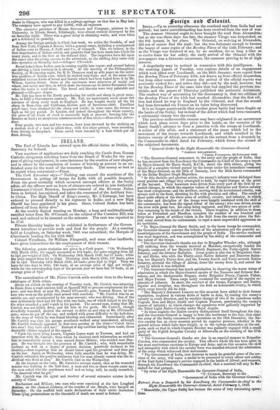IRELAND.
The Earl of Lincoln has entered upon his official duties at Dublin, as Secretary for Ireland.
Vast numbers of applications are daily reaching the Castle from Roman Catholic clergymen soliciting loans from the Board of Works for the pur- pose of giving employment, in some instances by the erection of new chapels, and in others by the completion of houses of worship at present in an un- finished state for the want of the necessary funds. The money so lent to be repaid when convenient—Times. The Cork Examiner says—" Nothing can exceed the exertions of the Government in getting off troops for India with all possible despatch. From the great mortality which occurred amongst officers at the Sutlej affair, all the officers now on leave of absence are ordered to join forthwith. Lieutenant-Colonel Brereton, Inspector-General of the Revenue Police force in Ireland, has rejoined, and takes the command of the Artillery fore: in China. The High Sheriff of King's county, Mr. L'Estrange, has been ordered to proceed directly to his regiment in India; and a new High Sheriff has been appointed in his place. Since, Colonel Stokes has been ordered off from Kerry also." At the weekly Repeal meeting on Monday, a long and multitudinously ramified letter from Mr. O'Connell, on the subject of the Coercion Bill, was read, and ordered to be inserted on the minutes. The rent was reported to be 1741.
Private liberality begins to be exhibited in furtherance of the Govern meat intentions to provide work and food for the people. At a meeting held at Loughrea, on Saturday week, 7001. was subscribed; the Marquis of Clanricarde heading the list with 3001.
Colonel Wyndham, Sir William Fitzgerald, and some other landlords, have given instructions for the employment of their tenants.
The following potato statistics are given in a Cork paper. "On Wednesday 19th March 1845, the supply amounted to 103 loads; the price ranging from 3d. to 51.1.. per weight of 211b. On Wednesday 18th March 1846, but 17 loads; while the price ranged from 6d. to 101ti. Thursday 20th March 1845, 137 loads; price 3c1. to 51d. Thursday 19th March 1846, 53 loads; price 64d. to 10 d. Thus we have for two days in 1845, 240 loads, at an average price of 41d. per weight; while for the corresponding days of the present year we have but 70 loads, at an average price of 81d."
The assassination of Mr. Pierce Carrick adds another item to the heavy catalogue of Irish crime.
About six o'clock on the evening of Tuesday week, Mr. Carrick was returning to Ennis from a road sessions held at Spancill Hill to procure employment for the poor; and was fired at near Mr. Daniel O'Connell's gate, Toureen House, by two men who were on the public road armed with muskets. " Mr. Carrick was on an outside car, and accompanied by his man-servant; who was driving. One of the men deliberately fired and hit him with two balls, one of which lodged in his hip; the other smashed a gold watch in his pocket. The second man, seeing that Mr. Carrick was not killed, fired, and hit -him in the groin. Mr. Carrick, though dreadfully wounded, desired the servant to drive on and stop at Mr. O'Connell's gate; where he got off the car, and walked with great difficulty to the hall-door, on the steps of which ho was found bleeding and exhausted. Immediately after Mr. Carrick was shot, his savage assailants walked away unmolested, although Mr. Carrick feelingly appealed to four men passing at the time—' Catch these two men! they have shot me!' Instead of any exertion having been made, those dastardly villains laughed at the appeal.
" Upon the event being known, Captain Leyne went to Tonreen, and had an interview with Mr. Carrick; from whom he received such information as enabled him to immediately arrest a man named James Molony, who resided near Dan- gan. He was brought into the presence of Mr. Carrick; who, with remarkable coolness as well as a degree of patient decision, positively declared to his identity,—first requiring that he should throw open his greatcoat and then put on his hat. Again on Wednesday, when fully sensible that he was dying, Mr. Carsick reiterated his positive testimony that the man already named was the in- dividual who fired at him." Mr. Carrick died on the Wednesday.
At the inquest on the body, Mr. Carrick's servant stated, that as his wounded master was walking to the hall-door, a man and two or three women came up: the man asked who the gentleman was? and on being told, he coolly remarked, "he deserved what he got."
Mr. Carrick was the agent and receiver of several extensive estates in the county of Clare.
Bnellannan and M'Goey, two men who were convicted at the late Longford Assizes, on the clearest evidence, of the murder of one Bergin, were hanged on Saturday. On the scaffold both made declarations of their entire innocence. These lying protestations on the threshold of death are usual in Ireland.


























 Previous page
Previous page